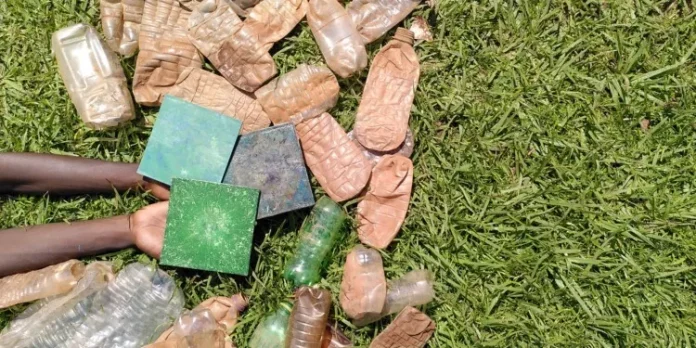In Gulu, Northern Uganda, a startup called Takataka Plastics is turning trash into treasure, offering an innovative solution to the city’s plastic woes.
Founded in 2020 by Peter Okwoko and Paige Balcom, the startup takes a circular economy approach. They collect plastic waste from surrounding areas, primarily polyethylene terephthalate (PET) from plastic bottles and packaging. This waste, often dumped irresponsibly due to high transportation costs to distant recycling facilities, finds new life at Takataka.
Using locally-made polymer processing equipment, the firm creates their flagship product: TakaTiles. These durable, affordable tiles made from recycled PET offer a sustainable alternative to traditional ceramic tiles. Launched in January 2023, TakaTiles have already gained popularity, selling out to hardware stores and construction companies across Gulu.
The firm’s vision extends beyond tiles. They’re branching out into producing a range of other sustainable products, including plant pots, chairs, coasters, laptop holders, and even visors for medical staff. This diverse product portfolio showcases the versatility of recycled plastic and caters to various needs.
Takataka’s impact goes beyond the environment. The startup employs 54 individuals, 26 of whom are vulnerable young community members. They actively promote responsible recycling practices by educating over 1,000 school pupils and training university students through their internship program.
With demand for TakaTiles exceeding current capacity, Takataka is poised for growth. A recent grant will fund a new permanent facility, transforming them into the largest PET recycler in East Africa. This expansion will create a production hub, workshop, storage space, community building, and even guest cottages for visitors and interns.
Takataka’s pioneering efforts haven’t gone unnoticed. The Swedish Embassy, the UN Food and Agriculture Organisation (FAO), various foundations, the Ugandan Ministry of Water and Environment, and academic institutions like Stanford University and UC Berkeley are now partnering with the startup.
Across the globe, plastic pollution casts a long shadow. Every year, over 400 million tonnes of plastic are produced, with a mere 10% recycled and the rest littering our planet. In Africa, this plastic plague contaminates vital water sources and ecosystems, posing a serious threat to both human health and the environment.




